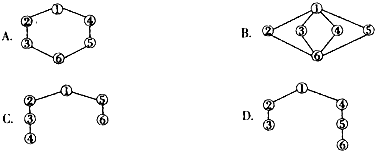题目内容
19.Chinese Dinner TableOf course,the main difference on the Chinese dinner table is chopsticks instead of knife and fork,but that's only superficial.Besides,in decent restaurants,you can always ask for a pair of knife and fork,if you find the chopsticks not helpful enough.The real difference is that in the West,you have your own plate of food,while in China the dishes are placed on the table and everyone shares.If you are being treated to a formal dinner and particularly if the host thinks you're in the country for the first time,he will do the best to give you a taste of many different types of dishes.
The meal usually begins with a set of at least four cold dishes,to be followed by the main courses of hot meat and vegetable dishes.Soup then will be served (unless in Guangdong style restaurants) to be followed by staple food ranging from rice,noodles to dumplings.If you wish to have your rice to go with other dishes,you should say so in good time,for most of the Chinese choose to have the staple food at last or have none of them at all.
Perhaps one of the things that surprise a western visitor most is that some of the Chinese hosts like to put food into the plates of their guests.In formal dinners,there are always"public"chopsticks and spoons for this purpose,but some hosts may use their own chopsticks.This is a sign of genuine friendship and politeness.It is always polite to eat the food.If you do not eat it,just leave the food in the plate.
People in China tend to over-order food,for they will find it embarrassing if all the food is consumed.When you have had enough,just say so.Or you will always overeat!
29.The real difference on dinner table between China and West is thatD.
A.You're treated to a formal dinner for the first time.
B.On Chinese dinner table,chopsticks replace knife and fork.
C.The host will do the best to give you a taste of many different types of dishes.
D.You have your own plate of food in West while in China everyone shares the dishes.
30.If you have a dinner in a Chinese home,in which order will the food be served?C
a.serving soup.
b.a set of four cold dishes.
c.staple food such as rice,noodle or dumplings.
d.the main courses of hot meat and vegetable dishes.
A.badc B.cabd C.bdac D.cdab
31.The"public chopsticks and spoons"are used toD.
A.taste different dishes
B.consume the food in the plate
C.show the friendship and politeness
D.put food into the plates of their guests
32.According to the message,the author's attitude towards Chinese dinner table isB
A.critical B.objective C.negative D.positive.
分析 作者介绍了中西方餐桌文化的不同,在西方你有自己盘子,而在中国大家共用盘子,中国人上菜的顺序,现在公筷的使用可以看出人们更礼貌更友好.
解答 29-32 D C D B
29.D 细节题:从文章第一段的句子:The real difference is that in the West,you have your own plate of food,while in China the dishes are placed on the table and everyone shares.可知中国和西方的餐桌的真正的不同是在西方你有自己盘子,而在中国大家共用盘子,选D
30.C 细节题:从文章第二段的句子:可知在中国吃饭的时候,上菜的顺序是:b.a set of four cold dishes.冷菜,d.the main courses of hot meat and vegetable dishes.主热菜,蔬菜,c.staple food such as rice,noodle or dumplings.主食,a.serving soup.汤,选C
31.D 细节题:从文章第三段的句子:Perhaps one of the things that surprise a western visitor most is that some of the Chinese hosts like to put food into the plates of their guests.In formal dinners,there are always"public"chopsticks and spoons for this purpose,可知"公用的筷子和勺子被用在把食物放在客人的盘子里面,选D
32.B 细节题:从文章的内容,作者介绍了中西方餐桌文化的不同,但是没有发表自己的观点,不存在批评还是赞扬,可知作者对中国式餐桌的态度是客观的,选B
点评 阅读理解题测试考生在阅读基础上的逻辑推理能力,要求考生根据文章所述事件的逻辑关系,对未说明的趋势或结局作出合理的推断;或根据作者所阐述的观点理论,对文章未涉及的现象、事例给以解释.考生首先要仔细阅读短文,完整了解信息,准确把握作者观点.

I had a philosophy(哲学)professor,whose untidy appearance was highlighted(突出)by a (41)B sport coat and poor-fitting thick glasses,which often (42)C on the tip of his nose.Every now and then,as most philosophy professors do,he would go off on one of those hard-to-understand"what's the meaning of(43)A"discussions.Many of those discussions went (44)D,but there were a few that really hit home(切中要害).This was one of them.
"(45)B to the following questions by a (46)A of hands,"my professor instructed.
"How many of you can tell me something about your parents?"Everyone's hand(47)B.
"How many of you can tell me something about your grandparents?"About three-fourths put up their hands.
"How many of you can tell me something about your (48)C?"Two out of sixty students raised their hands.
"Look around the room,"he said,"In just two short generations (49)D any of us even know(50)D our own great-grandparents were.Oh sure,maybe we have an old photograph in a musty(发霉的)cigar box.(51)A maybe we know the classic family(52)B about how one of them walked five miles to school barefoot.But how many of us (53)D know who they were,what they thought,what they took pride in,what they were afraid of,or what they dreamed about?Think about that.Within three generations our ancestors are all but forgotten.Will this (54)A to you?"
"Here's a better question.Look (55)B three generations.You are long (56)C.Instead of you sitting in this room,now it's your great-grandchildren.What will they have to say (57)D you?Will they know about you?Or will you be (58)A,too?"
"Is your life going to be a (59)C or an example?What legacy will you leave?The(60)D is yours.Class dismissed."
Nobody rose from their seats for five minutes.
| 41.A.well-designed | B.well-worn | C.well-ironed | D.well-cut |
| 42.A.ran | B.stood | C.rested | D.walked |
| 43.A.life | B.family | C.work | D.study |
| 44.A.somewhere | B.anywhere | C.everywhere | D.nowhere |
| 45.A.Answer | B.Respond | C.Contribute | D.Relate |
| 46.A.show | B.clap | C.touch | D.rub |
| 47.A.went down | B.went up | C.went around | D.went forward |
| 48.A.great-grandchildren | B.legacy | C.great-grandparents | D.family-tree |
| 49.A.almost | B.nearly | C.no | D.hardly |
| 50.A.how | B.where | C.which | D.who |
| 51.A.Or | B.And | C.But | D.So |
| 52.A.history | B.story | C.tree | D.song |
| 53.A.simply | B.roughly | C.generally | D.really |
| 54.A.happen | B.belong | C.refer | D.pass |
| 55.A.back | B.ahead | C.for | D.around |
| 56.A.ready | B.alive | C.gone | D.left |
| 57.A.to | B.for | C.behind | D.about |
| 58.A.forgotten | B.remembered | C.respected | D.scolded |
| 59.A.learning | B.meaning | C.warning | D.turning |
| 60.A.way | B.reason | C.explanation | D.choice. |
| A. | assignment | B. | address | C. | appointment | D. | arrangement |

